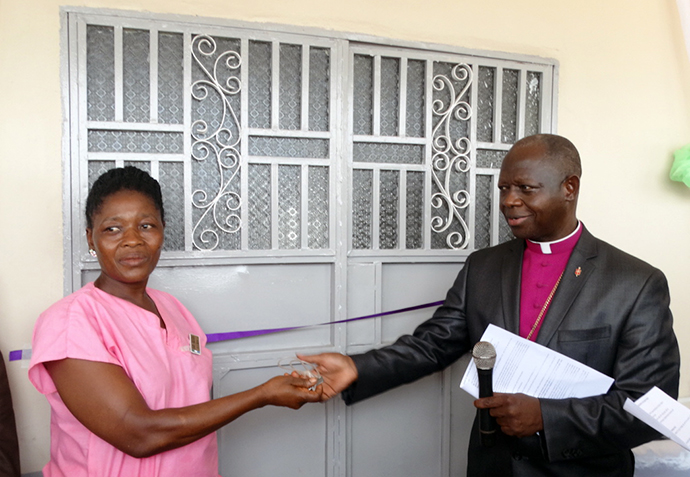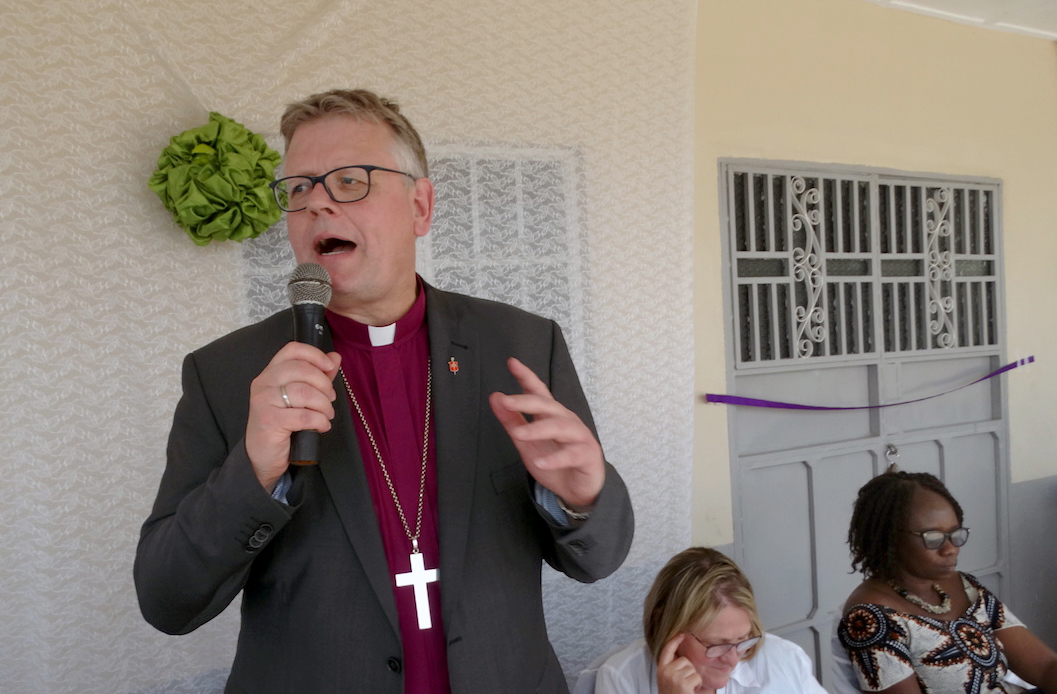The United Methodist Sierra Leone Conference has opened a health center in the remote community of Joyah, an off-road settlement in southern Sierra Leone.
The conference’s Community Empowerment for Livelihood and Development program, supported by The United Methodist Church in Norway, provided nearly $40,000 to build the rural health center, which includes a maternal and child health post.
The center will provide a range of services, including prenatal care, routine deliveries, immediate postnatal and neonatal care, routine vaccinations, treatment of childhood illnesses and malnutrition, basic first aid, community outreach services and surveillance for epidemic-prone diseases, said Dr. Ronald Marsh of the Moyamba District Health Management Team.

Sierra Leone Bishop John K. Yambasu (right) hands over keys to the new health center to the nurse-in-charge. The government, through the Moyamba District Health Management Team, will manage the center. Photo by Phileas Jusu, UMNS.
Health system strengthening has become a priority for the Sierra Leone government after the world's worst Ebola outbreak in the West African region, which killed 3,589 Sierra Leoneans including 221 health workers. The rapid escalation and deaths stemming from the epidemic in 2014 and 2015 were blamed on the country’s poor health infrastructure and unpreparedness.
The new health center in Joyah, which is fully equipped and infection prevention and control compliant, is just one of the ways The United Methodist Church is helping support the government’s efforts to improve health care across the country.
Joyah is 10 miles away from the main Taiama-Bo highway, and the nearest health facility is about 16 miles away. Before the center was built, most children and pregnant women, including those in labor, had to travel from Joyah to Taiama on motorbikes to access health services.
Sierra Leone has one of the world's highest estimated maternal mortality ratios of 1,165 deaths per 100,000 live births, according to the 2017 Maternal Death and Surveillance Report from the United Nations Population Fund. Of the 218,818 live births that took place in Sierra Leone in 2016, 5,608 were stillbirths. The report also notes that better monitoring during pregnancy, labor and delivery could prevent most of those deaths.
Ideal conditions were not in place in Joyah before the new health center. A makeshift structure, which Marsh called a “birth-waiting home,” was used to provide delivery services.
“The health facilities using community-housing structures did not have staff accommodation, water, sanitation and hygiene infrastructure,” he said.
The Moyamba District Health Management Team reached out to The United Methodist Church “in the spirit of good partnership,” Marsh said, to ask for help. “With good coordination and the grace of God almighty, we have achieved our goal,” he said.
Marsh urged members of the Joyah community to take advantage of the new health center.
“Do not take sick people, especially children, to quack doctors; bring them to this facility. Malaria is the biggest killer. Treatment of malaria is free for everybody, so fully utilize the health facility. There are well-trained community health workers in the catchment villages. Work closely with them. They are the health links between your community and your health facility,” Marsh said.
Sierra Leone Bishop John K. Yambasu said it was another great day in the history of the Joyah community.
“What we have done here today, we are compelled to do by our Lord and Savior Jesus Christ,” he said. “For a child to be able to go to school in the morning, for the teacher to be able to go to school, they need to be healthy,” Yambasu emphasized.

Norwegian Bishop Christian Alsted of the Nordic-Baltic Episcopal Area prays for the new health center and the people of Joyah, Sierra Leone. Photo by Phileas Jusu, UMNS.
“If you went to church and preached very well to a sick congregation like we had during Ebola, it would mean nothing. That is why we value the three-pronged approach: education, health and community development,” he said.
“We now have done the health center that used to be a makeshift facility to a standard … the facility now has the capability of servicing all 13 outlying village communities around Joyah,” said Smart Senesie, director of the program, at the dedication ceremony.
During that ceremony, Yambasu recognized the Rev. Oyvind Aske, top executive for The United Methodist Church in Norway, and Bishop Christian Alsted, Nordic-Baltic Episcopal Area, for their contributions. The church in Norway, in collaboration with the Norwegian government, funds the conference’s Community Empowerment for Livelihood and Development program.
Community Empowerment for Livelihood and Development provides funding but does not take the lead in the projects it sponsors. The program helps communities manage the work by providing training in project and financial management and basic engineering skills, as well as supervision.
Aske recounted how he had witnessed three occasions during a week’s time where the church was transforming lives in Sierra Leone as he spoke at the dedications of United Methodist University and a United Methodist Women’s Training Center in Bo, as well as the Joyah Health Center.
In addition to the health center, the church in Norway has helped fund school buildings, wells for safe drinking water, toilets, bridges and other projects in communities across the country, Yambasu said.
The community empowerment program first became involved in Joyah after receiving a request to build a bridge across a stream on the 10-mile stretch of road that branches off the main Taiama-Bo highway to Joyah. At the time, vehicles could not use the route during the rainy season, making it difficult to transport patients in emergency cases or women in labor out of the village.
Jusu is director of communications for The United Methodist Church in Sierra Leone. News media contact: Vicki Brown at (615) 742-5470 or [email protected]. To read more United Methodist news, subscribe to the free Daily or Weekly Digests.
Like what you're reading? Support the ministry of UM News! Your support ensures the latest denominational news, dynamic stories and informative articles will continue to connect our global community. Make a tax-deductible donation at ResourceUMC.org/GiveUMCom.




